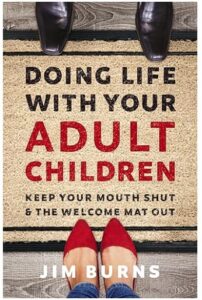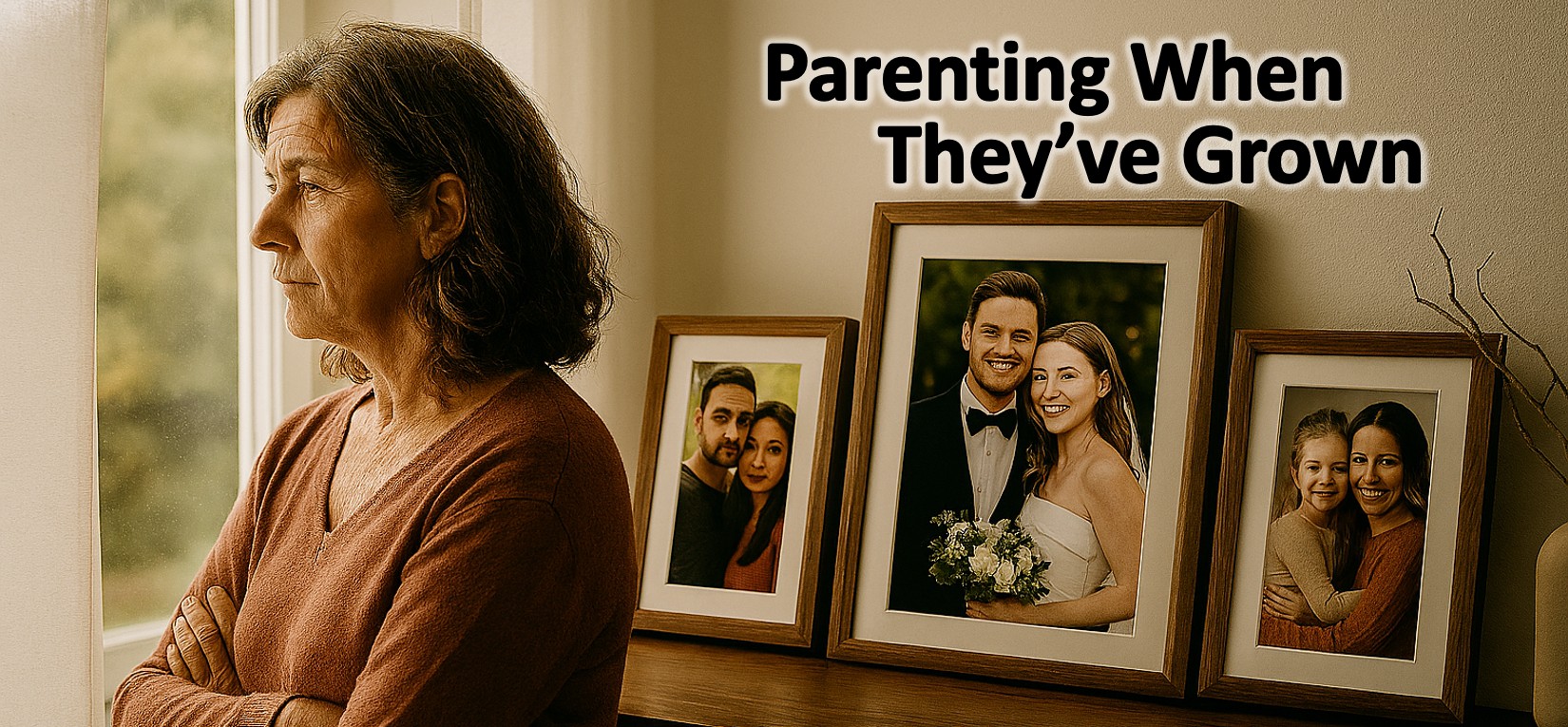Scroll down to read other articles.
How Do I Parent My Adult Children?
A Portrait of Today’s Young Adults
Portrait of Today’s Young Adults
Many things affect the description of a generation. That information helps parents see things from their child’s perspective, not only their own. Through technology, the changes in society and the world have happened much more quickly for recent generations than they did for us. Thanks to smartphones, social media, and a constant connection with everything good or evil on the internet, they have been exposed to or experienced things we never would have at a much younger age. A portrait of today’s young adults includes the following:
- They may be technologically fluent, but are emotionally searching.
- Their world is a place of constant fear-mongering where news is manipulated, and their source of information is rarely true. The sky is ALWAYS falling.
- They carry the weight of every global crisis without the emotional maturity to understand it or the experience to put it in its place.
- They are hyper-connected, but often lonely, craving real connections because emojis and likes or notifications do not help create a feeling of belonging.
- They have trouble connecting with other humans without being able to hide behind a phone, and tend to end relationships without really connecting.
- They open themselves up to dangerous people and situations without even knowing it.
- They have been groomed to be justice-minded, but aren’t exposed to all sides of a situation and don’t know how to see a problem from multiple perspectives.
- They are SEARCHING FOR GOD, but the world keeps telling them that the ONE true God is not real, and believing in Him is stupid.
Living Differently Than You Expected
As parents, when we look at the world from our adult child's perspective, we can’t help but be even more concerned about their well-being on a higher level. We parent the best way we know how, and then, it’s off to college, a job, and a life apart from their parents. You have no idea what choices they will make on their own, and they are delirious with their freedom, often not considering the consequences of those choices. Then it happens. Whether they’re in college or married and building their adult life with someone, you discover,
- They’re not going to church and said they don’t think they believe in God anymore.
- You see photos online that don’t show the values you thought you instilled in them.
- You’re not sure if “party” includes alcohol or drugs, but it sure looks like it.
- They don’t call as much as you wish they would.
- When they do call, they’re talking about social and political things you thought you covered in Don’t Fall For This 101.
- They may be wondering why you’re not making their student loan payments, their credit card payments, and their cell phone payments, like you used to.
- They’re in love with someone of a different faith, no faith at all, or looking for love in all the wrong places.
- They graduated from college, but don’t want to get a job. They’re fine living at home and are content with virtual relationships.
- They’re not parenting your grandkids the way you would.
- They’re not coming to you with their problems anymore.
That’s quite a list of sincere concerns. At some point, you probably lie awake at night, and your self-talk is demoralizing you and making everything worse. What is the answer to that self-talk?
Responding With Grace and Wisdom
What did I do wrong? If there ever was a perfect parent, it was God. He did NOTHING wrong, and Adam and Eve still rebelled. They made their bed and we continue to lie in it. I’m not going to tell you that you did everything right, because you didn’t, but I will tell you that parents are not responsible for every choice their adult children make. If you did make choices that you can see affect your children negatively in their adult lives, talk to them about it. We are all sinful people living in a sinful world. That’s why we pray for our kids from conception to the day we die.
You’re lonely and miss them being around. Of course you do. They were your primary focus, and your lives were entangled for 20+ years. But they are not appendages. They are independent souls that God has given you to raise for His benefit, so you don’t get to keep them for your benefit. We raise them to have their own lives and their own relationship with God. He has a purpose for them independent of you, and it might not include you the way you wish it would. My mom used to say, “Kids join your life for a while, they do not become your life. When they’re ready, they go off to begin lives separate from you, and you continue yours.” The relationship isn’t gone, but it does change.
They don’t call me every day. They don’t need me. Congratulations! They’re living independent lives! If something goes wrong, you’ve either taught them to ask someone for help, or they will call you. They do still need you, just not as much as they did before or in the same way they did before. You’re the only parents they have. To become a friend rather than a parent is a huge demotion. Good or bad, there is no one more influential in someone’s life than their parent(s). They know where you are, and they have your phone number. Allow them the freedom to become the people God wants them to be, even if they have to go through some tough times to get there.
They’re not living the way I think they should. You lived your life the way you thought you should, and they need to live their lives the way they think they should. You took them to church, taught them the faith and values you thought were important, and God wrote His law in their hearts. Do you remember when you were their age? How much did you want your mom and dad to tell you how to live, or what to think, or believe? Adult children need to make their own choices and live with the consequences of them to gain wisdom, experience, and courage.
They’re making bad choices and not asking my advice. Yes, they are making bad choices, and they may be going to somebody else for help or advice. At some point, they need to be able to seek out the help they need, and it won’t be you. One reason is that your unsolicited advice sounds like criticism to them. Another reason is that there will also be some things that God knows they need to go through that you will want to rescue them from, and shouldn’t. They need you to love them through those times and to be there when they come to you.
They’re rejecting the faith. This is the toughest one. Nobody wants to be in heaven without their kids. The sad truth is that no matter how we raise them, we cannot have faith for them. We cannot give it or grow it, and we cannot talk them into it. We can listen, talk about it when they have questions, have faith, pray, and trust that the God who loves them even more than we do has not left them.
The Prodigal Son’s Father
We often look at the Prodigal Son (Luke 15) as a story about a child’s rebellion and wasteful lifestyle. We think that our kids can learn a lot from that young man’s experience. But what about the father? What can we, as parents, learn from the father?
There once was a man who had two sons whom he loved with all his heart. He raised them both in a lifestyle and with values that he believed would help them grow into wonderful, caring, God-fearing adults. Then, his youngest son wanted to leave. The father DID NOT beg his son to stay, expect his son to check in to appease his worry or loneliness, text his son every day, keep track of his son on social media to find out what he was doing, contact his son to find out what was going on so he could give him unwanted advice, or rescue his son from the consequences of his choices.
He DID give his son what he asked for – his inheritance and his freedom – and watched him take his belongings and walk away into the big, ugly world where bad things can happen. AND HE WAITED, AND PRAYED. Then, one day, the son returned, and it was obvious that nothing had gone the way he hoped it would. The father DID NOT ask his son what happened, but he DID run to his son with open arms, gave him a huge hug, and threw a party to celebrate his return.
The best parent your children have is God. Leave them in His loving and capable hands, and be there when they need you. Be okay with having a smaller role in their lives and build a new life for yourself that doesn’t orbit theirs. Don’t tie yourself to their happiness or feel bad because their happiness is not tied to you. Trust God with them as they become who HE wants them to be, and remember that the path they lead is not yours, but His.
Laura Langhoff Arndt is an author and teacher of the faith with an MA in Classroom Instruction, and Director of Christian Education certification in the LCMS. She is the founder of the blog, Carpenter’s Ministry Toolbox.
Praying for Your Adult Children
One day, I heard Alistair Begg describe most people’s prayers as “when we pray, we simply close our eyes and think about ourselves.” After pondering that for a bit, I realized that he was right. Even in prayer, we are self-centered people. It’s the sin in us that we can’t get rid of. When we pray for others, the one thing we need to do most is to let go of what we want for them or what we think they need, and acknowledge that only God knows what they truly need and can give it to them.
When we pray, we open our hearts and share with God our fears and concerns as we ask Him to send His Spirit into the hearts and lives of our adult children. As you pray for them, keep in mind that God knows everything in our hearts. He knows our fears, concerns, and the anxiety that comes from them.
We don’t need to ask God to do what He does anyway, but God loves to be in a relationship with us. He enjoys hearing from us. Even though He knows what is in our hearts and minds, He wants us to talk to Him, and in return He promises that He hears, He listens, and He acts, not because we ask, but because He is God.
What does that mean? It means that when we pray for our adult children, it is not to inform God, but to remind ourselves that He is God, that He knows our children better than we do, loves them more than we do, and knows everything they have or will go through and struggle with. He also knows that we need to trust that His plan for them is much greater than ours could ever be.
The world is a sin-filled, evil, and dangerous place, and it helps us to say things out loud or even to verbalize them in our heads to God. It makes us feel better to ask Him to keep our children safe, especially from the unseen enemy that will try to take them away from Him, to ask Him to give them wisdom to see the lies the world tells about Him, to give them courage and strength of character to follow His Word and make life choices that please Him, and to strengthen their faith so that they always remember that no matter how far away He seems to be, He will never leave them, or forsake them.
As we pray, we are reminded that we can trust the Lord because He is God, and we are not. When we pray for our adult children, we feel comfort that God knows them, loves them, has their best interest at heart, and that He hears our prayer. No matter what we think we want for our adult children, His will is always better. Lord, I lift my child up to you. Thy will be done. Amen.
Submitted by Laura Langhoff Arndt
 Helpful Resource
Helpful Resource
Doing Life With Your Adult Children: Keep Your Mouth Shut and the Welcome Mat Out, by Jim Burns, PhD.
Are you having trouble connecting with your adult child when you’re just doing what you’ve always done? Do you feel tension when you’re together? Are you heartbroken by their behavior or choices? Are you frustrated because they won’t listen to your advice? You’ll find answers to these questions and more in this book that offers hope and encouragement, as well as some good old practical advice.
In Every Issue
Family Ministry Idea: Encourage Your Adult Children
The best way to encourage adult children in the faith is more about what not to do than what to do.
- DON’T push, pry, guilt (i.e., tell them you can’t follow them on social media anymore because it hurts too much), or unfriend or remove them from a social media account, or give advice they didn't ask for (they take it as criticism), or talk about it every time you see them.
- DO stop looking at their social media posts (unfollow if necessary), and PRAY for them, but not for them to live according to your expectations.
Prayer for Struggling Empty-Nesters
Heavenly Father,
Our children have left the comfort and shelter of our home. Help us, Lord, to surrender our fears, our need to manage their lives and choices, and our need to be needed by them. Remind us that this life is full of ups and downs and learning opportunities that you have chosen for them, and that our job now is to love them, keep our hearts open, our mouths closed, and to trust you. We know, Lord, that you love them far more than we ever could and that they are never alone, but in your loving care. When we are weak, strengthen our faith and trust in you, and fill us with the peace of knowing that you are now and always have been their best parent. Teach us to find and enjoy the true freedom that comes from trusting in you. As with all things, and with the help of the Holy Spirit, we commend our children to you. We pray this in Jesus’ name, Amen.

